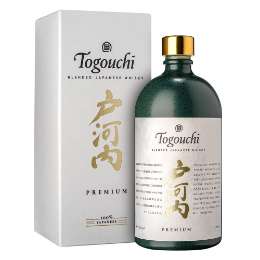Japanese Whisky
Japanese whiskies are known all over the world for their distinctive taste and high quality. Choose between Blended, Single Malt and Single Grain.
Kamiki Blended Malt Whisky 500ml
Nikka Coffey Grain Whisky 700ml
Nikka Coffey Malt Whisky 700ml
Nikka Days Blended Whisky 700ml
Nobushi Japanese Whisky 700ml
Suntory Toki Whisky 700ml
- 1
- 2
Frequently Asked Questions
01 What is Japanese whisky and how does it differ from other whiskies?
Japanese whiskey is a drink produced in Japan, with techniques mainly inspired by the Scottish tradition. It starts from the distillation of malt or corn and matures in barrels. Japanese whiskies differ because of their water, which is often softer and cleaner and because of the maturation methodology, which takes place in a climate that combines warm and cold, granting the drink unique flavor and aroma characteristics. These characteristics make it stand out from other international whiskeys, offering a special taste.
02 Which are the top Japanese whisky brands available at Konstantakopoulos liquor store?
At Konstantakopoulos liquor store, the leading Japanese whisky brands include Hibiki, Nikka and Suntory, offering a variety of excellent quality whiskies. Hibiki is known for its harmony of aromas and flavors, while Nikka whiskies offer a wide range of single malts and blends. Suntory, with famous drinks such as Yamazaki and Hakushu, is also very popular, recognized for the top quality and distinctive characteristics of its labels.
03 What is the production process of Japanese whisky?
The production process of Japanese whisky begins with the selection and fermentation of grains, usually malt or corn. Next, the wort is distilled in copper stills, where the alcoholic vapors travel through the pipes, to produce the spirit. Japanese whisky is then aged in wooden casks, often made of Japanese oak, to develop complexity, flavor and color. Japan's unique climate influences maturation, imparting the distinctive aromas and flavors that characterize the final product.
04 Why are Japanese whiskies often more expensive than other whiskies?
Japanese whiskies are often more expensive due to their limited production, high demand and methodical manufacturing process. The choice of quality ingredients, such as ultra-pure water and special malt, as well as the use of Japanese oak barrels for maturation, add to the cost. Aging in Japan's unique climate, which alternates from hot summer to cold winter, allows for rapid but balanced maturation, adding uniqueness to the product, but also to the price. The increased international reputation and limited availability of some labels also contribute to higher costs.
05 How should Japanese whiskies be stored to maintain maximum flavor and quality?
To preserve the maximum taste and quality of Japanese whiskies, careful storage is required. They must be stored in a cool and shady place, away from direct sunlight and heat sources, as temperature fluctuations can affect the composition and aroma of the drink. Bottles should be put upright to avoid contact of the alcohol with the cap, which could alter its elements and affect its taste. In addition, it is recommended that the bottles be opened within a few years of purchase, in order to enjoy the whisky at its best. Proper handling and storage ensures that Japanese whisky will retain its unique flavor and quality, for maximum enjoyment.

























